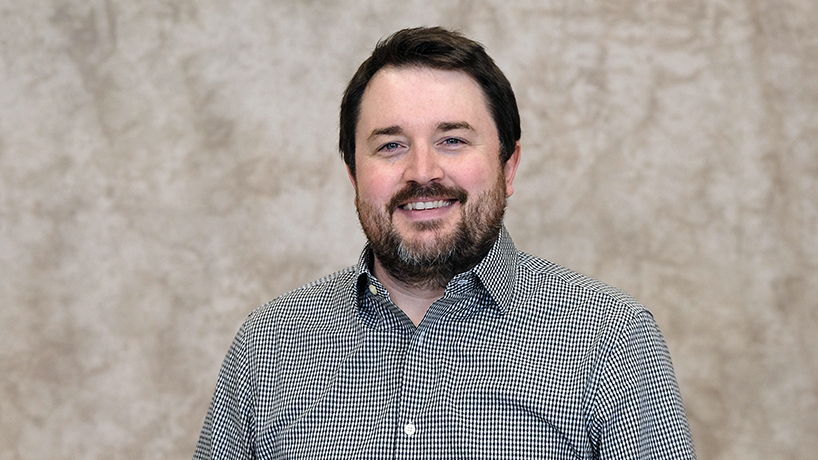
Assistant Professor of Biology Lon Chubiz won a prestigious NSF CAREER award for research on bacteria lipid monolayer membranes and how the bacteria that make them adapt those membranes to different soil environments. His funded proposal also includes the development of research experiences for early cycle biology students and with UMSL’s CLIMB program. (Photo by August Jennewein)
Ask anyone if they’ve had a stressful year – maybe their most stressful year yet – and you can bet on a head nod. But ask Lon Chubiz about stress, and you’ll find out that the assistant professor of biology at the University of Missouri–St. Louis has more than humans on his mind.
His sympathy is for bacteria.
“We’re not always the kindest to the world they live in,” he said. “We have the ability to forecast events, but it’s unclear if microorganisms are really good at this. Their world is volatile and dynamic, and they’re able to kind of make sense of their world, or at least tolerate it, and they do a pretty good job at it.”
How bacteria have adapted to hostile environments interests Chubiz, and antibiotic stress response served as his initial research area when he became a faculty member at UMSL in 2014. Since then, things have diverged.
“It’s been a really excellent academic home for me in terms of letting me explore some pretty wild ideas,” he said.
This year, one of those wild ideas paid off. In December, Chubiz found out that his proposal for the National Science Foundation Faculty Early Career Development Program had been recommended for funding, which became official on March 1.
CAREER is the NSF’s most prestigious award for early career faculty and focuses both on research and education. Chubiz was granted $759,888 for a five-year period. It was his third time applying, and Chubiz credits support from UMSL colleagues and staff in the Office of Research and Economic and Community Development in improving his application.
“I’m still in shock that it was selected,” he said. “I’m beyond excited. It was a really crazy pre-Christmas gift from the federal government.”
His research focuses on how some bacteria make lipid monolayer membranes – barriers of non-water-soluble molecules – and how those bacteria adapt those membranes to different soil environments. Scientists are aware of how normal lipid membranes are made but not monolayer membranes. Chubiz hopes to change that.
The topic first came to his attention thanks to a collaborator at Washington University in St. Louis. A geochemist, Associate Professor of Earth and Planetary Sciences Alexander Bradley, pointed out molecular fossils of membrane lipids commonly used in his profession.
“He was like, ‘Hey, how do bacteria make these crazy lipids?’ and I was like, ‘Well, I have no idea,’” he said. “We went back and forth on this. It was a problem that intrigued me.”
There are some direct applications to developing this type of understanding. Chubiz says it has the potential to reshape thinking about bacteria’s cell structure and function at a high level. There are also practical applications, which might include using microorganisms to do industrial processes such as breaking down or making chemicals.
“In order to do that, you often need to grow these microorganisms in a really stressful environment,” he said. “Maybe being able to get other bacteria to make these monolayer membranes might have some interesting stress tolerance properties.”
Understanding the membranes and how they might have formed to adapt to historical conditions as seen through the rock record could allow scientists to make inferences about the conditions on Earth at those times.
Building an understanding of bacteria in different soil environments also feeds into the educational components of Chubiz’s proposal. He’s working to develop a course for early cycle biology students to take soil samples in the St. Louis region and analyze the chemical composition and isolate bacteria that could then be used for further research.
“One of the empowering things is when students are able to see they’re able to do something, and that propels them to want to do it more,” he said. “Because research is really fun. It’s annoying; it’s difficult; it’s all the bad things that scientists always say. But when you do have discoveries, there’s really nothing like that.”
He’s also adapting that idea for high school students in conjunction with UMSL’s Collaborative Laboratory Internships and Mentoring Blueprint, a paid summer internship program for high-ability but low-opportunity students from several high schools in north St. Louis County, run by Patricia Parker, the E. Desmond Lee Endowed Professor in Zoological Studies.
Though CLIMB is a summer program, Chubiz wants to create a research experience for students during the academic year. He envisions working alongside high school instructors to build teaching modules that could then be run alongside standard curricula.
“I’m excited for students to interface with this sort of geographical data in the region, learning about soil quality, microorganisms,” he said. “Then there’s all sorts of demographic and sociological information, from census data, that we can map on to the data we’re collecting.
“I foresee a number of student-directed projects, where they may be asking these kinds of interfacial questions about the biology of what’s going on in the soils in their own backyards. Are there broader patterns to do with what we’re seeing that are reflected in the bigger social and demographic things in the region?”
Chubiz feels that being selected for CAREER might not have happened at a different institution. In addition to colleagues such as Parker and collaborators in the region, he’s found a supportive home in the Department of Biology and with Research Development.
“Maybe the idea would have come together anywhere,” he said. “And I might have had a grant application, maybe it would be a bit more generic, and that may have been successful somewhere else. But to get this, to get something that’s a really big deal and rare to get – that would not have happened without UMSL.”














